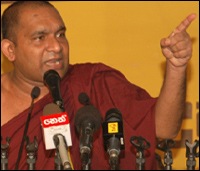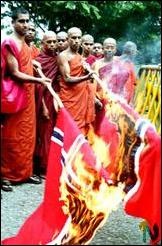The Sinhala Buddhist extreme nationalist organisation, Patriotic National Centre (PNC) led by Buddhist Monk Venerable Dhambara Amila Thero, Thursday said that it has decided to support General (retd) Sarath Fonseka, contesting in the forthcoming Sri Lankan presidential elections. Dhambara Amila Thero has been opposed to outside influence, both the Western and the Indian, since the Norwegian brokered Ceasefire Agreement in 2002 and his movement has been a key opinion maker of the Sinhala nationalism, exercising the pressure on the Sri Lankan state to nullify the Norwegian brokered P-TOMS in 2005 and to unilaterally withdrew from the Ceasefire Agreement in 2008. Ven. Dhambara Amila Thero was formerly the leader of the National Bhikku Front (NBF), an ultra Sinhala nationalist organisation of Buddhist monks.
 The PNC leader Dhambara Amila Thero at a media briefing held Thursday at Colombo National Library Auditorium said that his organization supported General Sarath Fonseka who achieved the country’s ‘main goal’, by ‘defeating terrorism.’
The PNC leader Dhambara Amila Thero at a media briefing held Thursday at Colombo National Library Auditorium said that his organization supported General Sarath Fonseka who achieved the country’s ‘main goal’, by ‘defeating terrorism.’
The extremist monk who preferred Mahinda Rajapaksa in 2005 has commented that Fonseka, whom he met recently, knew more about politics than the individuals who had succeeded in politics in recent times.
Rajapaksa’s dependency on certain powers and his family-centered politics has caused certain sections of extreme Sinhala Buddhists to prefer Sarath Fonseka, said a newspaper editor in Colombo commenting that the move by the Sinhala nationalist monk also demonstrated that the Sinhala nationalists were confident in taking forward their agenda facing any eventuality at the elections.
The PNC was launched in September 2008 as the Patriotic National Movement (PNM) began to disintegrate following the rift between JVP leaders Somawanse Amarasinghe and Wimal Weerawansa, who developed close ties with Sri Lankan President Mahinda Rajapaksa. Mr. Weerawanse was the Secretary General of the PNM.
The PNM was formed with three primary aims, to resist "any attempt at the division of the country in the name of devolution of power," to resist the "neo-colonial economic exploitation" by Western powers, and to resist the "cultural invasion," and preserve the "[Sinhala] civilization and culture."
Wimal Weerawansa, who broke away from the JVP launched National Freedom Front (JNP) in May 2008.
Buddhist monk Dhambara Amila Thero, who was Information and Publication Secretary of the PNM and a ‘pioneer’ of Manel Mal (Blue-Lilly) Movement, a JVP mass-movement to pay tribute the members of the Sri Lankan armed forces is a senior lecturer in archeology at Sri Jayawardenepura University.
"Western forces carry out their strategies through countries that have similar cultures in the regions to divert mass protest and the present Indian intervention against the struggle against terrorism is a reflection of this," the Thero said in October last year," he said in an address in October 2008.
 Amila Thero has been consistent in his message to the Sinhala masses: "Victory in the military front alone cannot defeat separatism as it has several other fronts." There are other fronts such as economic, political and cultural, according to the extreme Sinahala nationalist archeology lecturer.
Amila Thero has been consistent in his message to the Sinhala masses: "Victory in the military front alone cannot defeat separatism as it has several other fronts." There are other fronts such as economic, political and cultural, according to the extreme Sinahala nationalist archeology lecturer.
He has been waging continuos agitations against the Norwegian brokered Cease Fire Agreement between the Government of Sri Lanka (GoSL) and the Liberation Tigers of Tamileelam (LTTE), till the GoSL unilaterally withdrew from the CFA in January 2008.
Amila Thero, in 2005, also staged fast-to-death campaign against the signing of the P-TOMS between the UPFA Government and the LTTE.
JVP parliamentarians sought the Sri Lankan Supreme Court to declare the P-TOMS null and void arguing that it was signed in violation of Sri Lanka’s constitution and that the P-TOMS undermined sovereignty and territorial integrity of Sri Lanka. Amila Thero, who then represented the National Bhikku Front (NBF) and the Patriotic National Movement (PNM) filed cases against the P-TOMS. The agreement was later nullified by the Sri Lankan judiciary.
On 23 April 2003, Amila Thero urged the Norwegian Ambassador in Colombo Hans Brattskar to remove Head of Sri Lankan Monitoring Mission Tryggve Tellefsen, alleging impartiality. Six months later, on 23 October 2003, Sri Lankan President Chandrika Kumaratunga, wrote a letter to Norwegian Minister of Foreign Affairs, Mr Jan Petersen, asking the Government of Norway to replace Tryggve Tellefsen as head of the SLMM.
(For updates you can share with your friends, follow TNN on Facebook and Twitter )
